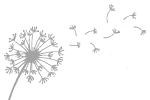“I Wish” No More–Study For Skill Development
Before I could read—I was a “writer.” Flashlight, paper, and pencil in hand, I’d drag my favorite blanket into my bedroom closet and there in the privacy of my hanging clothes, I covered countless pages with fantastic swirls and lines. I had no doubt. I was a writer.
Learning to read Dick and Jane posed no threat. Even Nancy Drew I perceived as achievable. It wasn’t until high school and Steinbeck’s Grapes of Wrath, that I succumbed to self-inflicted intimation. Over night I decided I could never be a writer, because I couldn’t write as good as John Steinbeck.
Thus I was inflicted with the toxic virus of “I Wish.”
Sigh, “I could never be like that.”
True. As long as I engaged in magical thinking—wishing—my dreams wouldn’t come true.
What I failed to realize in high school is that Steinbeck most likely wasn’t born just writing. He likely spent hours at the craft of it and wrote numerous drafts and rewrites. He probably suffered “bad” days and “writer’s block” at times. In fact, reading a history of Steinbeck I have since found, He traveled to New York City where he took odd jobs while trying to write. When he failed to have his work published, he returned to California and worked in 1928 as a tour guide and caretaker at the fish hatchery in Tahoe City.
In my own life it took decades of time and the best public speaker I’ve ever heard, Michael Brandwein, to turn “I Wish” into “What Are They Doing, How, and Why?” This is a question that once learned, I ask to this day.
“What Are They Doing, How, and Why?”
1) Write a list of people with skills you admire, whom you “Wish” you could be like.2) Study them. What, how, and why are they doing that which is causing your “I Wish?” Be as specific as possible.
Simple. All I need is a notebook and a pen and a person I admire. Once I figure out what they are doing I have the knowledge and can practice the skills myself. It’s not magic; there are specific steps by which we get from A to B to C.
- Be specific
- Write it down
These skills are not inherent. Identity the traits you want to develop. Mr. Brandwein told us, “I see no more than you but I have trained myself to notice what I see.”
When I learned this it changed my life. All of a sudden, I had a powerful daily system to become what I wanted to be. At first I was busy making up for lost time. I’d be with someone and out of seemingly nowhere would come that awful sinking stomach feeling of If only I could and, . . . I wish.
The first person I “wish mapped” is subscribed to this blog: Audrey. I was fascinated by her skill as a facilitator. I wished I could be the same. Out came the pen and notebook, what was she doing, how, and why? – She includes everyone, makes it safe for everyone to say their thoughts, praises people for speaking up, values the opinions of others, doesn’t try to control people’s thoughts or speech, keeps her ego out of it, allows others to shine, keeps the focus on the greater good, gives others credit, stays flexible . . . I filled pages. Once I had this knowledge, I could start to practice the skill myself.
I don’t get that sinking feeling anymore. Instead my mind now says, “Hmm, how are they doing that.” If you ever catch me watching you with a reflective look on my face, I’m probably studying a skill you have that I’ve just admire.
Mr. Steinbeck would be pleased to know . . . my first published book will be released in a few weeks by the University of Minnesota Press. It’s a powerful page-turner, not fantastic swirls and lines etched in a closet . . . and only because I stopped wishing and started asking what, who, and why.
© Atina Diffley 2012

Read Atina Diffley's Blog: What Is A Farm?
Subscribe By Email. It’s Free
Enter your email address:
Worshops & Consulting
Visit Organic Farming Works LLC for Workshops and Coaching/Consulting with Atina and Martin Diffley.


